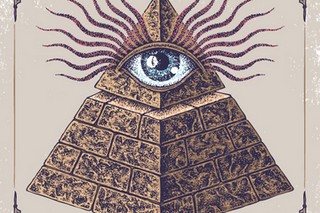The Illuminati, translated as the people of the light, refers to several groups and to prevailing conspiracy theories about some of these groups’ importance or continued influence in the modern world. Most specifically, they were a radical group in Bavaria founded in 1776, which gave rise to other countries also forming related groups.
The Bavarian Illuminati, as well as its offshoot groups, was a secret society, to which many politicians and intellectuals were drawn. The Society of Masons was thought to have close ties with members, and many Masons joined the Illuminati. Some Mason groups felt that they were religiously conflicted because many of the other group’s members were atheists.
As far as history can suggest, Illuminati groups from Europe were some of the more advanced thinkers of the time period, reflecting humanism philosophy emerging at the time. They were opposed to power exerted by churches and by the nobility. The organization, as a secret society, was illegal. During its early years, this secret society may have had as many as 10 branches in Europe and 2000 members drawn from the intellectuals in Europe. According to historical sources, the group fell apart by 1795.

This is when speculation and conspiracy theory steps in to lend a hand. Conspiracy theorists assert that the Illuminati still exists today and has extraordinary influence over governments. One thing considered “evidence” of existence is the presence of the eye on the pyramid of a one US dollar (USD) bill. And most conspiracy beliefs held about the secret society consider the order as largely influential on the Freemasons.
Some believe that key members in the early formation of the US government, like Thomas Jefferson, and Ben Franklin were members of the Illuminati, and that the group continues to influence world government. It is suggested that the society has taken an active role in most major events in history. Some theorists allege that certain Presidents and members of the British monarchy are members.
The Illuminati has recently gained some popularity with the Dan Brown novel Angels and Demons. Brown is most recognizable as the author of The Da Vinci Code. He takes the society on as a subject of interest, suggesting that all major scientific thinkers from the Age of Reason onward have been secret members.
Brown depicts a constant war between the Illuminati and the Roman Catholic Church, outlining the conflict between not only atheism and Christianity but also specifically science and religion. His work, which many acknowledge advances conspiracy theories about the group, suggest the Illuminati is still in existence and in continued warfare with the Vatican. Brown also intimates that members of the group have infiltrated every powerful political organization, and is largely composed of the world’s scientific community.
Nonfiction works have made the same contention as Brown’s, that the group still exists today and is in constant battle with the Catholic Church. Some theorists believe that the Illuminati work toward establishing a New World Order and have influenced most world events in the 20th century. What can be verified is that there are several groups using the name in the 20th century, based on the principles of the Bavarian and European groups. These include the German Ordo Illuminatorum, the Grand Lodge Rockefeller in the USA, and the Spanish Orden Illuminati.
Various perspectives exist on the benefits of the Illuminati in the modern world. Some believe that the group’s focus on science will ultimately destroy the world. Others think that they exist to lead the world with a principal dependence on science, and that they will specifically gain preeminence after some catastrophic event on the earth destroys most of its inhabitants. To some, the society is an object of fear, to others a source of hope, and to many, it is merely a curious group exaggerated into importance by conspiracy theorists and works of fiction.
– —— —– — — —– — —
Another take on he illuminati:
The Illuminati was an 18th-century secret society made up of numerous influential intellectuals and freethinkers of the time.
The organization, which is also known as the Bavarian Illuminati, opposed the Roman Catholic Church’s control over philosophy and science; promoted the education of women and their treatment as equals; sought to “enlighten” people’s minds and free them from superstitions and prejudices; and tried to reduce the oppression of the state.
The Illuminati was the brainchild of Adam Weishaupt, who was the chair of canon law and later the dean of the faculty of law at the University of Ingolstadt in Bavaria (a state in southeast Germany) in the early 1770s, according to “New England and the Bavarian Illuminati” (Columbia University Press, 1918), a nonfiction book about the secret society.

